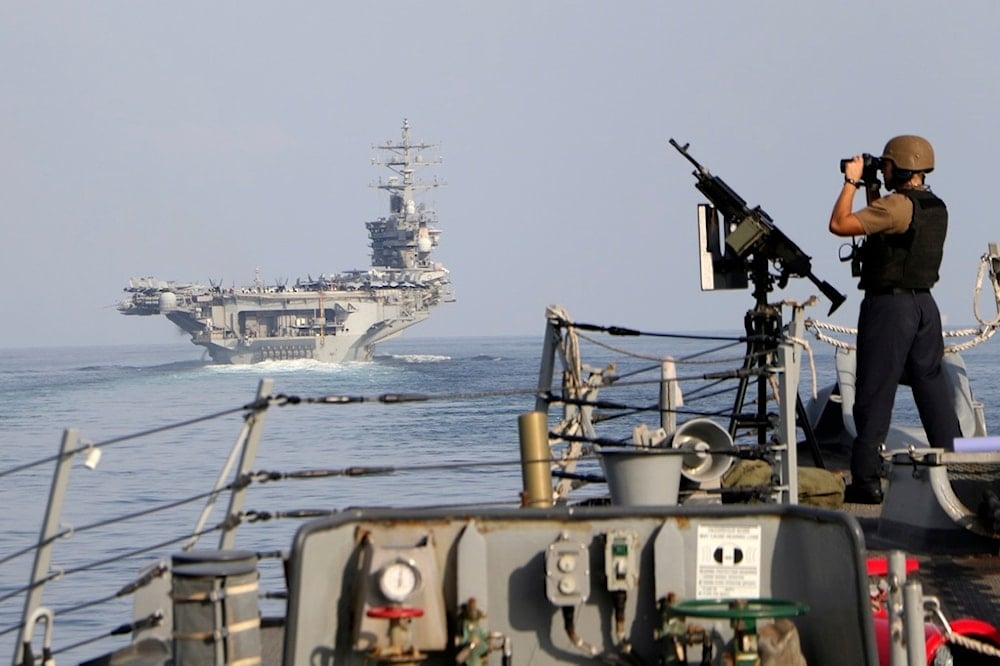Iran Shura Council recommends closure of Hormuz Strait after US strike
Iran's Guardian Council recommends closing the key Strait of Hormuz after US strikes on major Iranian nuclear facilities, raising fears of global energy supply disruptions.
-

The aircraft carrier USS Dwight D. Eisenhower and other warships cross the Strait of Hormuz into the Gulf on Sunday, Nov. 26, 2023, as part of a wider American deployment in the Middle East. (Information Technician Second Class Ruskin Naval/U.S. Navy via AP)
Iran’s Shura Council has recommended the closure of the Strait of Hormuz in response to the recent US military strikes targeting the country’s nuclear facilities.
The recommendation comes amid heightened regional tensions, but the final decision rests with the country's Supreme National Security Council.
Speaking to the Young Journalists Club news agency, Iranian MP Esmail Kowsari said that the option of closing the strait is “seriously on the table,” adding, “A decision will be made if necessary.”
What is the Strait of Hormuz?
The Strait of Hormuz, situated between Oman and Iran, links the Gulf to the north with the Gulf of Oman and the Arabian Sea to the south. At its narrowest point, it is just 21 miles (33 km) wide, with shipping lanes only 2 miles (3 km) wide in each direction.
Roughly 20% of the world’s oil consumption flows through this narrow passage. Between early 2022 and May 2025, between 17.8 million and 20.8 million barrels of crude oil, condensates, and refined fuels transited the strait daily, according to data from energy analytics firm Vortexa.
Read more: Iran ready to escalate aerospace operations in response to aggression
Oil, gas, and global stakes
Major OPEC producers, including Iran, Saudi Arabia, the UAE, Kuwait, and Iraq, export most of their crude via the Strait of Hormuz, primarily to Asian markets.
While Saudi Arabia and the UAE have developed alternative pipeline routes to reduce dependency on the waterway, the US Energy Information Administration estimated in mid-2024 that about 2.6 million barrels per day of spare pipeline capacity exist to bypass the strait.
Qatar, a top global exporter of liquefied natural gas (LNG), ships nearly all of its LNG through the Strait of Hormuz.
The US Fifth Fleet, headquartered in Bahrain, is tasked with protecting commercial shipping in this critical maritime corridor.
Read more: US bases across region are point of vulnerability, not strength: IRGC
History of conflict in the strait
The Strait of Hormuz has long been a flashpoint for regional and global tensions. During the 1980–1988 Iran-Iraq War, both nations targeted each other’s energy exports in what became known as the Tanker War.
In July 1988, a US warship shot down an Iranian civilian airliner over the Gulf, killing 290 people, a tragedy Washington claimed was accidental, while Tehran labeled it a deliberate act.
In January 2012, Iran threatened to block the Strait in response to Western sanctions. More recently, in May 2019, four oil vessels, including two Saudi tankers, were attacked off the UAE coast just outside the Strait.
Since then, three vessels have been seized by Iranian forces near or within the strait, two in 2023 and one in 2024, many of which followed US seizures of tankers linked to Iranian oil shipments.

 3 Min Read
3 Min Read









